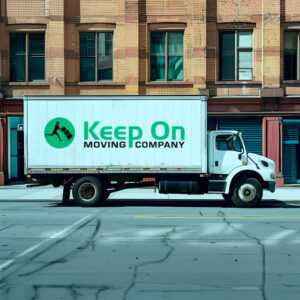Moving can be a daunting task, even with meticulous planning. At Keep On Moving Company, we strive to make your transition as seamless and stress-free as possible. To ensure you’re fully informed about the real costs involved in moving, we’ve created this helpful guide to break down the expenses associated with relocating to a new home, whether it’s a house or an apartment.
The Hidden Costs of Moving
Packing Supplies
Don’t overlook the cost of packing materials. From boxes and tape to bubble wrap and packing paper, these supplies are essential for safeguarding your belongings during transit. The number and size of boxes you’ll need vary based on your home’s size and the items you’re relocating.
- 10-20 small boxes for heavier items like books and fragile glassware.
- 20-30 medium boxes for lightweight items such as towels and clothing.
- 15-30 large boxes for bulky but lightweight belongings like bedding.
- 5-10 wardrobe boxes for hanging clothes.
Consider investing in specialized boxes for delicate items like dishes and glasses for added protection.
Moving Assistance
While enlisting friends and family to help with your move might seem cost-effective, it could lead to mishaps and damage to your belongings. Hiring professional movers ensures a smoother and safer transition. Depending on your needs and budget, you can opt for full-service movers who handle every aspect of the move or partial services like loading, transportation, and unloading.
Factors Affecting Moving Costs
Several factors influence the cost of moving services, including:
- Size of your home
- Number of items to be moved
- Special items requiring extra care (e.g., pianos, oversized furniture)
- Distance of the move
- Moving date and time
- Advance booking
Additionally, don’t forget to budget for gratuities for the movers as a token of appreciation for their hard work.
Truck Rental
If you choose to handle the move yourself, renting a truck or trailer is necessary for transporting your belongings. Consider the size of the vehicle based on the volume of items you need to move.
Travel Expenses
For long-distance moves, factor in travel expenses such as gas, accommodation, and meals if driving. If flying, account for airfare, luggage fees, and incidental expenses.
Time Investment
Moving requires significant time and effort beyond physical relocation. Allow time for packing, setting up utilities, and familiarizing yourself with your new surroundings. Taking a few days off work post-move can ease the transition and help you settle into your new home comfortably.
Conclusion
Moving entails more than just the cost of hiring a moving company or renting a truck. By understanding the full scope of expenses involved, you can budget effectively and minimize surprises along the way. Whether you choose to handle the move independently or enlist professional help, our goal at Keep On Moving Company is to ensure you have a smooth and enjoyable moving experience.






